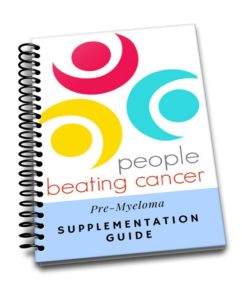
Diagnosed with SMM, SPB, or MGUS?
Learn how you can stall the development of full-blown Multiple Myeloma with evidence-based nutritional and supplementation therapies.
Click the orange button to the right to learn more.
- You are here:
- Home »
- Blog »
- Pre-Myeloma »
- Diagnosed w/ MGUS- Should I Panic???
Diagnosed w/ MGUS- Should I Panic???

“Several lines of evidence point to a genetic predisposition to Multiple Myeloma and other plasma cell dyscrasias.”
Hi David- Thanks for this information as it seems to be the only one of its kind. I was diagnosed with MGUS after a blood workup by my rheumatologist for suspected RA. When that was negative this protein IgA was found in my blood and I have been tested for 3 years in a row now by a hem/onc.
This year my M-Spike went from 0.3 to 0.6. The dr didn’t even point this out but just said all is stable. I don’t show any other abnormalities on my labs. I brought to his attention the increase in the M-spike and he said that’s ok it’s stable. So frustrating! I need to take this into my hands. I need to lose about 40 lbs and I have started the curcumin and reversatrol and cbd.
Should I be so obsessed this being scared of MM? My aunt died of this and the Dr. said it isn’t inherited but when I research I see otherwise.
Hi Anna-
I will turn your question “Should I be so obsessed this being scared of MM?” back to you with basic replies to your comments earlier in your post.
1) I was diagnosed with MGUS after a blood workup…This year my M-Spike went from 0.3 to 0.6. ”
While MGUS, monoclonal gammopathy of undetermined significance, is not cancer, it is classified as pre-cancer or pre-MM. Your risk of a MM diagnosis is increased at about 1% per year.
While an increase of your m-spike from .3 to .6 is tiny and may even be a fluctuation in the testing process, again, you are wise to keep an eye on your MGUS. Technically, full blown MM is an m-spike of 3.0 or above.
2) “When that was negative this protein IgA was found in my blood and I have been tested for 3 years in a row now by a hem/onc.
You are smart to keep an eye on your pre-MM stage with annual blood testing.
3) “My aunt died of this and the Dr. said it isn’t inherited but when I research I see otherwise.”
This sentence points out your two most important issues.
First, there is thin recent research that indicates that MM does have a familial component. Meaning, your risk of a full blown MM diagnosis increase even more with a close family member having had it.
Secondly, general oncologists are usually inexperienced when it comes to MM and more so when it comes to pre-MM. At less than 2% of all cancer diagnoses annually in the U.S. being MM, you are talking about a rare cancer. You should establish a relationship with a MM specialist.
If you tell me where you live, I can make recommendations for MM specialists near you.
4) “I need to lose about 40 lbs and I have started the circumin and reversatrol and cbd.”
Increased weight increases inflammation. Increased inflammation increases your risk of an MM diagnosis. Frequent moderate exercise decreases your risk of MM. As do supplements such as curcumin and resveratrol.
I will link the Pre-MM supplement guide below.
I often tell people who receive a diagnosis of pre-MM that they are in the cancer sweet spot. By this I mean that they don’t have cancer yet they have an incentive to change their lifestyle and reduce their risk of multiple myeloma. You can live with MGUS for years an potentially your entire life.
As you can see, there are few absolutes with a diagnosis of MGUS. It is all about increased and decreased risks. How much effort you make to reduce your risks is up to you.
Let me know if you have any questions.
David Emerson
- MM Survivor
- MM Cancer Coach
- Director PeopleBeatingCancer
Recommended Reading:
Inherited predisposition to multiple myeloma
“Conclusion and future directions-
Several lines of evidence point to a genetic predisposition to MM and other plasma cell dyscrasias. Until recent years, only case-control studies and reports of occasional high risk families supported this view. More recently, identification of hyperphosphorylated paratarg proteins and identification of putative susceptibility loci by GWASs have provided more firm evidence indicating inherited predisposition to MM and related disorders.
The discovery of pP-7 as a frequent target of paraproteins in MM offers a potential link between the old concept of chronic antigenic stimulation as a potential cause of MM, and observations of familial predisposition as well as racial disparities in the incidence of MM. GWASs have to date identified several susceptibility potential regions of interest in MM and further molecular studies aimed at identification of specific genes of interest are ongoing.
Although these discoveries are provocative, further work will be required to identify the genes and mechanisms underlying inherited susceptibility to MM, and these studies will be facilitated by the use of additional resources such as family registries and large-scale consortia…”
Myeloma Specialist Directory
“Over 80% of myeloma patients are seen by community oncologists but data shows that patients who have a specialist on their team live longer. In fact, if myeloma patients are treated by a myeloma specialist within the first year, a UNC study says they live 38% longer. It’s common for myeloma patients to have a team that includes periodic consultations to craft a treatment strategy with a myeloma specialist but receive care closer to home. Myeloma patients should always feel confident that they can obtain a second opinion if they need help…”


